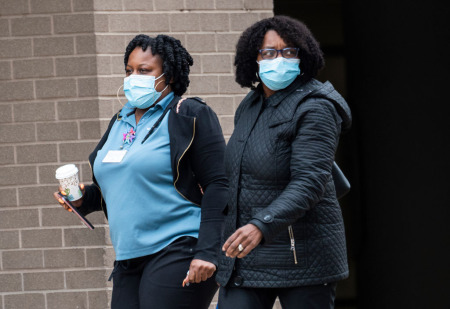Many workers battle depressive symptoms amid pandemic, but few seek professional help: study

As much as 35% of U.S. workers have battled depressive symptoms amid the coronavirus pandemic but few have been seeking professional help, a recent study published by the Society for Human Resource Management has found.
A new partnership between Quest Diagnostics, the world's leading provider of diagnostic information services, and Catapult Health, a virtual health care provider which features self-collected at-home specimen collection and mental healthcare support, hopes to change that for employees and their dependents, as many put off routine visits to the doctor for fear of getting COVID-19.
In the study, Navigating COVID-19: Impact of The Pandemic on Mental Health, researchers surveyed a random sample of 1,099 U.S. employees from the online panel Prolific from April 15-16. Some 89% of the employees worked for an organization, 11% were self-employed, 19% lived alone; 33% lived with one other person, while another 33% lived with two or more people.
A majority, 58% of the individuals in the study, also reported living with at least one person considered to be in a vulnerable population such as healthcare workers, essential employees, those over 65 years old or an immunocompromised person.
Researchers found that 22–35% of employees in the study reported experiencing symptoms of depression often, and as many as two in three reported experiencing depressive symptoms at least sometimes.
And to deal with their depression-related symptoms, more than half of these workers, 60%, reached out to a family member or friend (42%), a colleague (11%) or a mental health professional (7%) for help. Nearly 40% of employees reported doing nothing to cope with their depression-related symptoms.
David Michel, CEO of Catapult Health, said when employees skip seeing trained health professionals, the long-term consequences can be dire.
"When people skip doctor visits, the consequences can be grave in terms of poorer, long-term outcomes and higher medical costs," he said in a statement to The Christian Post. "Because they sponsor much of the nation's healthcare, employers end up absorbing these costs to a great degree. Our unique virtual care model is designed to change that by taking preventive care into employees' homes, thereby solving access to care, safety, and overall preventive care compliance."
In the SHRM study highlighting the mental health of workers during the pandemic, nearly one in four employees, 23%, reported often feeling bad about themselves, or that they are a failure who has let themselves or their family down. And almost two in three of those who reported feeling like a failure were individuals who lived with at least one member of a vulnerable population.
Some 25% of workers reported having little interest or taking little pleasure in anything, feeling down, depressed or hopeless during the pandemic, while another 22% reported having trouble concentrating on things. Of that cohort, 65% lived with someone who is a member of the vulnerable population, and the youngest employees reported trouble concentrating at higher rates.
Women, 54%, were more likely to have trouble concentrating than men, 45%, while some 35% of workers reported having little energy or often feeling tired.
Many employees also reported exercising less, and a majority, 61%, reported not getting enough sleep at least some of the time.
"Healthcare is complex and not every individual can navigate it successfully alone. Virtual care that includes convenient testing paired with clinical consultations, mental health and prescription history, makes it easier and less complicated for employees to access the care they need when they need it," Wendi Mader, executive director of Quest Diagnostics, Employer Population Health, said. "This is why Quest is committed to investing in solutions that combine lab testing with a virtual encounter to empower employees to easily connect to data-driven care that improves health and reduces costs."





















